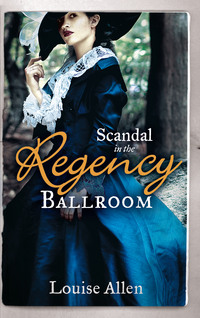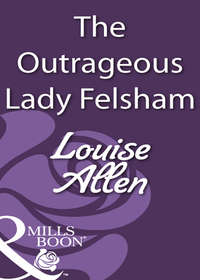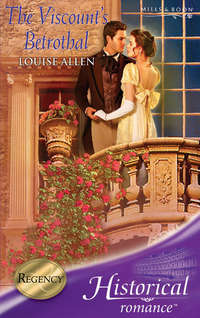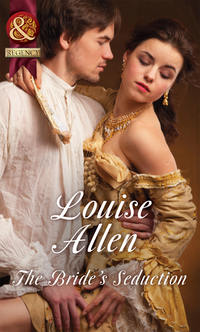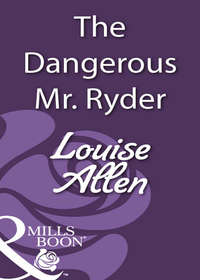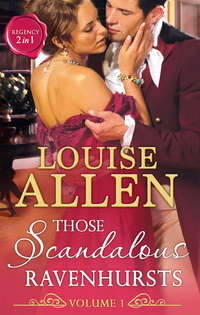
Полная версия
Regency Pleasures and Sins Part 1
A blush stained her cheeks. “There is no need—”
“There is. But I should do a better job of it seated. If we might?” He gestured toward the cottage.
He held his breath as alarm, indecision—and longing played across her expressive face.
Yes, she still cared for him. Exultation mingled with restraint and a fierce desire to embrace her, kiss away the caution in her eyes, seize the opportunity here, far from prying eyes, where they might recapture and deepen the wordless intimacy they’d found in the moonlit garden.
Too soon yet, he told himself, stilling fingers already curled with anxiety to hold her again. “You are too kind to deny me that opportunity, aren’t you?”
Before she could reply, the sound of galloping hooves approached. Beau looked up to see Lady Ardith, resplendid in a fur-trimmed riding habit, bearing down upon them, and cursed under his breath.
The lady drew rein and smiled down at him. “Lord Beaulieu, good day to you! Is it not a brilliant morning for a ride?”
Did a grin flit briefly across Mrs. Martin’s lips? Before he could be sure, she curtsied. “Lady Ardith.”
The blonde regally inclined her head. “Mrs. Martin.” Her horse danced sideways and she tightened the reins, her trim posterior bouncing against the sidesaddle.
A deliberate move? Beau wondered cynically. With Mac departing this morning, was the wench already trolling for a replacement?
It won’t be me. “Fine indeed, Lady Ardith. Do not let us keep you from your ride. Mrs. Martin, shall we?” Beau gestured to the cottage.
“If you should wish me to delay a few moments until you finish your business with Mrs. Martin—” Lady Ardith plied her long lashes and gave him a smoky glance “—I could be persuaded. ‘Tis so enjoyable to ride with a partner.”
Mrs. Martin made a choking sound, which she turned into a cough.’ ‘I can bring any necessary supplies with me when I call on your brother,” she volunteered.
“No need for you to tarry then, my lord,” Lady Ardith said. “Have you ridden the trail by the river? ‘Tis wonderous scenic once you reach our land. My husband had several little grottos constructed that are charming and quite … private. Shall we race?” She inclined her head to the stallion he’d secured to the fence. “Your beast looks quite fresh, and my mare—” she sidled him a glance “—is nearly the best mount in the county.”
“Do go, my lord,” Mrs. Martin said, her innocent tone at odds with her suspiciously twitching lips. “I shouldn’t wish to you to miss Lady Ardith’s kind offer.”
He shot her a sardonic glance. The grin she returned looked entirely unrepentant.
“Another day, perhaps,” he told the horsewoman.
“Come now, I dare swear you’ve time for a little sport,” Lady Ardith persisted. “I promise you’ll not regret it.”
Beau had no desire to conduct his business with Laura Martin while this lightskirt lay in wait for him outside the cottage. Giving Mrs. Martin an indignant glance that caused her to choke down another gurgle of laughter, he turned his attention to the necessity of getting rid of the annoying Lady Ardith.
“A short ride,” he said.
“Excellent.”
Ignoring the lady on the sidesaddle, he turned back to Laura Martin. “I shall see you later, ma’am.”
A devilish twinkle lighting her eyes, she dipped a demure curtsey. “My lord, Lady Ardith.”
Not bothering to acknowledge Mrs. Martin, Lady Ardith brought her horse closer. “Can that stallion of yours perform as well as my mare? Let’s see!” With that, she spurred her mount.
“Soon,” he warned Mrs. Martin, and set off.
Half an hour later Beau brought his stallion to a halt at the shed behind Laura Martin’s cottage. He was not, he thought smugly as he dismounted and tied the horse to a post, the only person who could fob off an unwanted escort.
Leaving his mount hidden back here, where no passer-by could see it and decide to interrupt his visit, Beau stealthily traversed the garden, intending to enter by the back porch door.
Memories of the vision he’d stumbled upon the last time he’d silently approached down these herb-lined pathways kindled a flicker of heat in his stomach. Unbidden, the feel of her waltzing in his arms under the spangled stars, the taste of her lips meeting his eagerly, welled up in him, fanning the flicker.
Not yet, he told himself, curbing the memories. He’d not have the wit to calm her fears and win her trust if he walked in with his body aflame.
He paused by the door and raised his hand to knock.
And heard something—Mrs. Martin’s high clear voice interspersed with deeper tones.
Not again. Frustration humming through his veins, he paused on the threshold, debating whether to wait out the annoyance of a second visitor or to slip away and return later.
He’d first determine who her caller was, he decided. Silently he eased the back door open and crept down the hallway until he could see into the front parlor.
The scene he spied there paralyzed both thought and movement. In front of Mrs. Martin, who sat on the sofa by the window, he saw Reverend Blackthorne down on one knee.
Chapter Thirteen

Disengaging her hand, Mrs. Martin backed away from the vicar—straight toward Beau. Recovering his frozen wits in an instant, he leaped aside to flatten himself against the staircase wall, knowing it imperative he remain hidden until he’d sorted out what to do about this extremely disagreeable development.
His first furious reaction—to stalk into the parlor, seize Reverend Blackthorne by his shirt collar and haul him bodily out of the cottage—he quickly discarded as impolitic, if eminently satisfying. His second thought was a throat-drying fear that in his self-absorbed concentration on maneuvering Mrs. Martin into the sort of relationship that would best satisfy his desires, he’d let this underestimated rival steal a perhaps insurmountable advantage over him.
If Blackthorne did in fact assuage Mrs. Martin’s distrust of men by offering marriage, and she accepted him, how was Beau to counter that? He might lose her before he’d barely had a chance to press his own claims.
Cold purpose focused him, let him shake his mind free of angry dismay. There had to be some way to stop this. Without a particle of remorse, he focused on overhearing as much as possible of the conversation.
“Please, Mr. Blackthorne, I beg you proceed no further,” said Mrs. Martin, distress in her cool voice.
That reassuring request was followed by the soft pad of Mrs. Martin’s footsteps, but in his current position Beau could not see where the occupants of the parlor now stood. Move away from him, he silently urged.
“Surely my feelings cannot come as a surprise,” Blackthorne said, a bit of reproach in his tone. “I’ve long held you in esteem, as our dealings with each other must have shown.”
“I felt you esteemed me as a member of the community who attempted to assist those in need, as I esteem you,” she replied. “Nothing more.”
“Perhaps I was not as … forthcoming as I should have been,” he conceded. “A man of my position must naturally be circumspect to avoid becoming fodder for the local gossips. But I regret that restraint, if it left you in ignorance of the steadily increasing warmth of my regard. So much that I must beg you let me continue!”
Beau heard heavier footfalls, and grimly concluded the reverend must have pursued Mrs. Martin. “Please, sir—”
“No, dear lady, you must allow me voice! Granted, had certain … events not transpired I should not have chosen to approach you in so precipitous a manner, but at this critical moment both personal desire and my duty as your spiritual advisor demand that I address you now.”
Beau heard Mrs. Martin’s ragged sigh. “Continue then, if you must.”
“I beg you will acquit me of conceit if I state what I see are the advantages to you of this match. At this moment I occupy a position which might appear to offer little worldly gain, but I have an income independent of this living and the ear of my father, who is, I assure you, a most influential man. My wife and children will want for nothing. For months I’ve been increasingly drawn by your modesty, excellence and nobility of character, a beauty of soul surely the equal of your lovely countenance. I think we could pursue a common purpose. While I cannot claim to be without flaws, I hope I bear no more than my human share. Should you do me the honor of becoming my wife, I should earnestly strive to make you happy.”
Though Beau could hardly have hoped the vicar would offer a lady of his parish carte blanche, still the formal proposal shook him to his boots. A widow in Mrs. Martin’s tenuous position, unless she held her suitor in absolute abhorrence, would be a fool to refuse such an offer.
Torn between dismay and hopeless anger, Beau waited in wretched silence for the inevitable acceptance.
“Mr. Blackthorne, please understand I am fully cognizant of the brilliance of your offer. A woman who occupies as humble a position as I could not help but be honored that a man of your birth and position would consider her for his wife, but—”
“You are a lady born, as any gentleman could see, quite worthy to be offered a man’s hand and name,” Blackthorne said with some heat.
“Thank you, sir. But flattering as it is, I—I must decline your proposal.”
Beau sagged back against the wall, shock and gladness weakening his knees. He could not imagine why she would reject so clearly advantageous an offer, but at this moment, having little doubt that Reverend Blackthorne would probably attempt to persuade her otherwise, he focused all his thoughts on willing her to persist in refusing it.
“You … find me disagreeable?” Despite himself, Beau felt a grudging sympathy at the mingled pain and humility in the reverend’s voice.
“No, of course not. It’s just …” Beau heard her soft, quick step, as if she were pacing the room. “I … can only tell you that my … experiences with the wedded state were such that I cannot envision ever entering it again. Pray, do not press me further.”
So Ellie was right—her marriage had not been happy. Apparently the vicar had not been aware of it, for several moments of silence followed her declaration.
“My dear lady, I deeply regret any unhappiness you may have suffered,” he began again, apparently taken aback but undaunted. “Still, I vow that if you will but entrust your future to me, I will do all in my power—”
“Sir, I beg you say no more! My resolve on this matter is unshakable.”
“If you forbid me speak, I must honor that request, but you cannot silence me on a matter of even graver import. No, madam—” Beau heard the soft tones of her protesting voice under the vicar’s more strident ones “—this must be said. It has not escaped me that recently you have become the object of interest to … a man of great position. Indeed, he has singled you out to a degree that has already begun to cause speculation in the neighborhood. I must warn you that I seriously question this nobleman’s intentions toward you.”
“Indeed, sir, I am sure you are mistaken!” Mrs. Martin’s gratifying prompt response mitigated Beau’s immediate desire to spring from his hiding place and plant the disparaging reverend a facer. “I am much too far beneath that person’s notice,” she continued, “for him to have any designs upon my person whatever. I agree that both he and his sister have singled me out to an extraordinary degree, but that is only because of the service I’ve rendered their kinsman.”
“Dear Mrs. Martin, it does honor to the purity of your character that you view Lord Beaulieu’s actions in that light, but in this you must bow to my superior knowledge of the world. I have closely observed the manner in which his lordship looks at and treats you. I wasn’t called to the church until after I’d been some years on the town, and speaking as a fellow aristocrat who knows how such men’s minds work, I assure you in the strongest possible terms that you do indeed stand in danger.”
Another fraught silence followed that impassioned speech. Hands itching for the feel of the vicar’s throat under his thumbs, once again Beau had to exercise supreme discipline to keep from bursting into the room. Damn the man’s effrontery in so viciously maligning Beau’s interest in Mrs. Martin! As if he desired only some hasty, meaningless backstairs coupling. Surely Mrs. Martin knew better than that. He might truly murder the vicar if the man weakened the fragile trust Beau had been working so hard to build.
“Y-you cannot believe that I encouraged—”
“Of course not! I’m sure I know your character better than that. But others will be less discerning and more judgmental. Believe me, Lord Beaulieu’s very particular attentions, if they continue much longer unchecked, will create enough speculation that your character will be impugned and your standing in this community will suffer, be you innocent or not.”
“I would stand condemned even if innocent?” A note of outrage colored the distress in her voice.
“Such is the world. Which is why I felt strongly that I must make now an offer that, I assure you, I have been contemplating for some time. Your becoming a married lady would put a halt to any untoward advances as well as preserve the purity of your reputation.”
“I am to marry you solely to preserve my reputation?”
“For much more than that, I trust! I hope I do not err in believing that you cherish for me at least a modicum of affection—affection that two like-minded individuals committed to a life together could enrich and deepen. As my own emotions are already considerably engaged, I cannot stand by and see you harmed by one grown so accustomed to having his every wish and whim deferred to by others that he neither sees nor cares what harm he may do!”
“Mr. Blackthorne, having, as you’ve noted, spent much time with Lord Beaulieu, I must protest that harsh assessment. Whatever his intentions—and I still take leave to doubt he has any toward me at all—I cannot believe he would knowingly harm me.”
Bless you, sweet lady, Beau thought, both gratified and humbled by her avowal.
“Given my own aspirations, perhaps I am too harsh,” the vicar allowed. “But the danger to your reputation, even should his lordship’s interest be as fraternal as you assert, is nonetheless grave, and grows daily more acute. Please, my lady, I beg you to let me take your hand, offer you the protection of my name and my heart.”
“Sir, you will please release my hand.”
“Not until you’ve given me the assurance that you will carefully consider what I’ve said. I cannot leave until you guarantee me at least that.”
“M-Mr. B-Blackthorne, you are d-distressing me. P-please let go my hand now!”
“You will consider my words? You’ll promise me that?”
“Y-yes—no, oh, I don’t know! J-just go, I b-beg you!”
That ragged speech, followed by a choked sound suspiciously like a sob, had Beau poised on the balls of his feet in murderous rage, ready once more to burst into the room and drag the persistent clergyman away.
Before he could proceed, Mr. Blackthorne said, “I’ll withdraw now, ma’am, as you request. I am heartily sorry to have distressed you by speaking so forcefully, but I reiterate, the matter is grave. Rest assured I shall keep an eye on the cottage. We will speak further when you are calmer. Your servant, Mrs. Martin.”
Much as he’d like to go a few rounds with the vicar, Beau had no desire to have the man catch him hiding in the shadows like a petty thief. Quickly he slipped back down the hall and out the porch door.
Where he stood, irresolute. Standing out most clearly in the confused swirl of violent emotions racking him were a total incomprehension of why Mrs. Martin would refuse Blackthorne’s proposal and an immense relief that she had. Fear of the vicar’s repetition of his offer warred with a buoyant hope that it was not too late for Beau after all, humility at her trust in his honor, and the fervent need to prove himself worthy of it. A renewed imperative to claim her for his own fired up, fueled in part by anguish at the thought of her trapped in a distasteful marriage. How could any man not have cherished so gentle a heart, so sterling a character?
It seemed his careful theory lay in tatters. Apparently she had been wife rather than mistress to her lieutenant. Not only had her flat statement about marriage been utterly convincing, but a woman anxious to redeem her character should have leaped at, rather than refused, an honorable offer.
Unless her emotions were already elsewhere engaged. A rush of elation followed the thought. Dare he hope she might have refused the vicar at least in part because of the connection calling them together?
He’d find out—right now. Be she widow or wayward miss mattered naught—only their future together was important. He turned back toward the door, took two strides, and halted once more.
The vicar had been right in at least one assertion—Mrs. Martin was too distraught to receive anyone. Strongly as instinct called him to her side, prudence counseled him to give her time to recover from the turmoil created by the vicar’s visit. He should call again later.
But as he reluctantly turned toward the garden, the sound of a shuddering sob stopped him.
The first was followed by another, then another. He stood paralyzed as a series of deep, gasping sobs flayed his already raw emotions, wrenching from him both the desire to flee the premises immediately and the need to return and comfort her.
Mama, Mama, don’t cry! I’ll help you. Can’t help … darling. Too … late.
Sweat broke out all over his body as he jerked his mind from the echo of his nightmare of that long-ago accident. He hadn’t been able to help then, his mama and the unborn child she carried dying even as the frantic six-year-old jerked and tugged at the skyward-staring door of their shattered carriage. But much as the sound of Mrs. Martin’s sobs ignited a revulsion that shuddered through him, he knew he couldn’t walk away and leave her alone in her anguish.
He forced himself back down the hallway into the parlor. She still stood in the center of the room, face buried in her hands while sobs convulsed her frame. Neglected wife? Abandoned mistress? Whatever had befallen her, the agony shaking that slender body said the experience had been unendurably painful.
The remaining shreds of nightmare dissolved beneath an overwhelming need to help her. “Mrs. Martin,” he called softly, not wishing to startle her.
In a gasp of breath, the sobs halted. Before he could take a step, she jerked upright, eyes wide, face contorted.
With fear, he realized. “Don’t be alarmed—it’s Beau Bradsleigh.”
It took a long moment for the words to penetrate, before the alarm faded from her eyes. “M-my lord?”
“I—I was passing by and … and chanced to hear you. What has happened to so overset you? Please, let me help.”
At first she stared at him as if his words had no meaning. An expression of infinite weariness gradually overtook the misery in her eyes. “T-thank you, my lord. But ‘tis nothing that can be helped.”
“Everything can be helped.”
Her tear-stained eyes examined his face. Tell me, he silently willed her. She opened her lips, hesitated. Closed them again with a sigh.
And then, almost as visibly as if a curtain had descended, her face changed to a mask of distant politeness. “D-did you require something, my lord?”
He could not let it go, not now when he knew—he knew—she had come so close to telling him the truth. “I rather thought you might.” Alertness leaped back to her face. “My lord?” “I could be of greater assistance if you would but answer me one thing. Who are you, Laura Martin?”
Chapter Fourteen

It was her worst nightmare come to life. Discovery.
Sheer panic blinded her. As the first Shockwave receded, leaving behind a fear that seeped into every pore, her vision cleared and she saw Lord Beaulieu standing before her. Staring, his face intent and questioning.
In that moment she realized with bitter certainty that her overlong hesitation had just given her away. ‘Twas too late now to summon up some glib remark, to feign bafflement. Even had she the inner resources left after her interview with the vicar to find the appropriate words.
Wearily she closed her eyes and stumbled to the window, leaning her forehead against the cool glass. She sensed Lord Beaulieu follow her. Like the vicar, who would not take her polite refusal and go away, who had pursued her, cornered her, seized her hand in a move so reminiscent of Charleton she’d almost become physically ill.
A faint spark of anger flickered and caught. No, she had not endured all she had suffered to live to this moment, managed day by painstaking day the recreation of her whole being, to let it end now.
Before she could decide how best to counter him, she heard Lord Beaulieu’s soft voice behind her. “Whatever troubles you, know I only want to assist. Please, let me help you.”
She felt a touch to her shoulder and whirled to face him, the reaction too ingrained to suppress. “Help? And just how do you intend to do that? By hinting to the community that I am not what I seem? Destroying my name, my reputation? Seeing me cast from the meager niche I’ve carved out for myself here, as a king would crush a bothersome insect?”
“Of course not! How could you think that of me? Who you were—who you are, does not matter to me as much as solving what causes you such distress. Will you let me?”
She stared at him with ferocious intensity, evaluating the angle of his body, the set of his expression, every remembered nuance of his voice. Her heart, her mind, her instincts all told her he was telling the truth.
He would not betray her.
Relief washed through her in a dizzying wave. “Y-you will say nothing?”
She must have swayed, for he reached out a hand as if to steady her. Drew it back as instinctively she stiffened. “I will say nothing without your leave.” In his eyes she could read only a warm concern. “But that does not touch the heart of the matter. Tell me, sweet lady, how can I help you?”
The dregs of panic drained away in an upwash of emotion. How she loved him, this principled man devoted to his family who wanted only to ease her suffering, as she had eased his brother’s. Who had power that nearly rivaled the king’s, yet would not hold her against her will. Who coupled strength with gentleness, as her father had.
Not until the vicar’s warning had she fully realized the depth of her desire to be with the earl, talk with him, touch him, become his lover for however short or long a time he would grant her. Not until then had she fully realized how impossible of fulfillment that desire truly was.
The vicar spoke the truth, however unpalatable. Now that Kit Bradsleigh was healing, to remain on any terms of intimacy with a man so superior to her in rank and fortune would be interpreted by the world in only one fashion. To be thought the earl’s chère amie in the sophisticated, amoral world of the London ton would be unremarkable—probably even elevate her status. In the more rigid, moralistic society of rural England, such a perception would ruin her reputation, make her an outcast from local society and very likely destroy her livelihood.
Being with the earl was but a foolish, impossible dream, and had been so from the very beginning. Strange that having to destroy it hurt so much.
She turned her face from the earl’s too penetrating gaze. “If you truly desire to help, stop calling upon me. Do not speak with me except in greeting. Do not be seen with me outside in your brother’s sickroom.”




